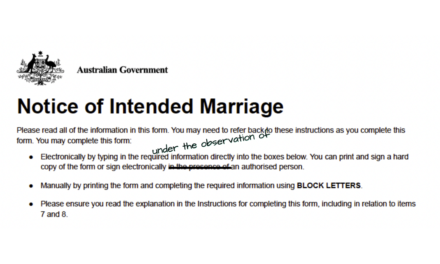I attended my first meeting with the other celebrant association/networks and staff from the Marriage Law and Celebrants Section (MLCS) of the Commonwealth Attorney-General’s Department (AGD) on Monday 28 October 2019. Josh couldn’t come with me because he was travelling to Iceland. Of course.
From what I’d heard from other participants, I was prepared for a pretty tense, uncomfortable experience. But instead it was a remarkably positive and productive experience, and I’m feeling pretty happy about the whole thing! (Ask me again in six months when we see if anything discussed has actually been implemented…)
We covered a LOT of content over the course of five or so hours, and I took LOTS of notes. Formal minutes are always released by MLCS a few months after the meeting, but for now, here are the major highlights as I saw them:
Celebrant registration charge
The process was much smoother this year than in 2018, mainly because a text message reminder (9 September) was sent in addition to the email reminder (23 August). 223 celebrants were deregistered for not paying their fee, down considerably from the 371 deregistered in 2018. MLCS staff estimate that less than 50 of those were unintentional non-payments of the fee; that the rest were celebrants who simply let their registration lapse. As of Monday 28 October, only 14 celebrants have applied for re-registration.
Forms review
Some of you will be aware that this is one of my major bugbears; the forms review has been ongoing in one form or another since January 2015, and it’s quite frankly ridiculous that it takes five years to review half a dozen documents. MLCS have taken on board the copious feedback they received after the 2018 public consultation about the need to include parents’ names on marriage paperwork for family history reasons, so these have been reinstated. After much back and forth with BDMs and the Australian Bureau of Statistics, it looks like the information to be collected has finally been clarified, and the forms are now being modernised. MLCS was not prepared to give us a timeline, but I’m hoping we’ll have new forms introduced by 1 January 2020, with a likely transition period of 12 months to use up any stock of the old forms.
OPD in 2020
MLCS is 99% sure there will not be a compulsory topic for OPD next year; some RTOs may choose to offer an elective around the new forms if they’re available in time.
Updates to the Marriage Celebrants Portal
Self-reporting of OPD is now available; celebrants can upload their OPD certificates to the portal to ensure AGD is aware they have fulfilled their obligations (this will be cross-checked with information received from the relevant RTO).
Any changes made to contact details will now show on the register in real time; previously it could take a few days for changes to show up.
I’ve written before about how to change your details on the register and why you should keep your information up to date. There is also a new fact sheet available that outlines the same information.
OPD/application process survey
The survey closed on 22 October, and 2200 responses were received. That’s less than a quarter of all registered celebrants. While I recognise that’s a fantastic result from a typical market research perspective (where a 10% response rate can be considered good), I’m disappointed that more celebrants didn’t choose to have their say on such an important topic. Also, as I’ve mentioned before in relation to the annual CoCA survey, a small response rate means the responses are likely not representative of the wider celebrant population’s views. Anyway, on to the preliminary results.
Most respondents were in favour of streamlining the application process (although I have argued that most won’t have understood what the questions were actually suggesting), and about half were in favour of reducing OPD to one hour per year. MLCS staff stressed that no decisions have been made at this point.
There was a wide discussion in the room about OPD and the application process. MLCS staff asked that association feedback on the issues raised and any suggestions for OPD into the future be sent in by the end of November.
This is a really big opportunity; MLCS have said they are open to a complete redesign of the OPD process. If you have any ideas or suggestions of how you might like OPD to work in the future, please send them through to [email protected] by 20 November, so we can collate and put together our position by the end of the month.
Cap on celebrant numbers
There was a lengthy discussion about the possibility of reintroducing a cap on celebrant registrations. MLCS staff are not in a position to effect any change in this area; their only responsibility is to ensure celebrants are performing marriages that meet the requirements of the current legislation. If anyone feels strongly enough about this issue, the only way to have it considered is to lobby their local member to put forward an amendment to the legislation. Ultimately though, the current government has a deregulation agenda and is unlikely to consider a cap.
Updated Guidelines
The current Guidelines, released in July 2018, are already out of date, mostly due to the new fact sheet on marriage celebrant obligations in an online environment. MLCS staff are currently working on updating them, and they hope to have them released in the next few months. Association and network reps will have the opportunity to review them, so don’t worry, I’ll be doing my usual careful reading of them J
After hours shortening of time for medical reasons
This is an issue I asked the AFCC to raise several months ago (in my role as an AFCC member), after I heard about a Darwin celebrant with a groom whose terminal illness had taken a turn for the worst on a Friday evening. They wanted to get married that weekend but obviously there was no way for them to apply for a shortening, and by the Monday he had died.
MLCS had checked with BDMs, who said they didn’t believe there was any need for this; as I pointed out, that’s because they’re not hearing about couples who would have applied if there was a way to do so, but have not because it’s too late by the time the office reopened.
MLCS were asked to revisit the issue, and they suggested the best thing would be for associations to lobby the state governments, as prescribed authorities to review shortening of time applications are state government appointments (magistrates or BDM staff etc).
I know the AFCC is working on this, and I believe the MLCS will raise it again. Watch this space for more info as it becomes available.
That’s it for this meeting! Let me know if you have any questions!





Regards to the Updated Guidelines… Was one of the points raised about having to sign two form 16s in an online environment?
Hi Kim! No, this wasn’t raised, because this doesn’t just require a change to the Guidelines but a change to the Marriage Act itself. The only way this will be changed is if celebrants lobby their local Federal Member of Parliament to put through an amendment to the Marriage Act 🙂